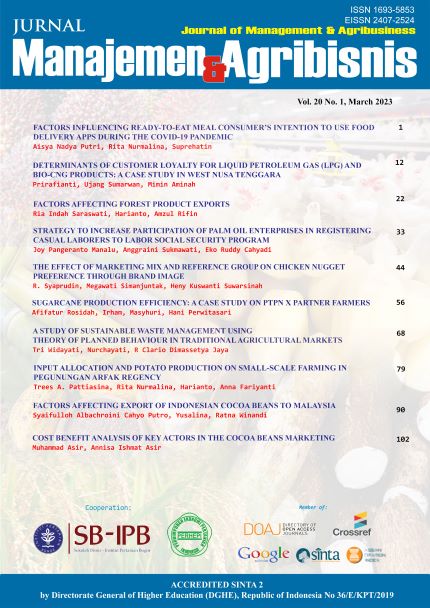Abstract
Indonesia is an agricultural country with many superior export products, including cocoa beans. Indonesia was once the third-largest cocoa producer in the world. However, there has been a significant decline in the export quantities of cocoa beans in recent years. This research aims to analyze the factors affecting the export quantities of Indonesian cocoa beans to Malaysia using the Error Correction Model (ECM) method. The cocoa bean commodities recorded in this research are whole or broken, raw or roasted with HS code 1801. The estimation results show that the factors that significantly affect the export quantities of Indonesian cocoa beans to Malaysia in the long term include Indonesia cocoa beans production, the export price of palm oil, and the dummy export duty policy. On the other hand, factors that significantly affect the export quantities of Indonesian cocoa beans to Malaysia in the short term include Indonesia cocoa beans production and the dummy export duty policy. Policy recommendations that can be developed include increasing cocoa production and productivity by simultaneously carrying out intensification and extensification programs, reducing exports of cocoa in the form of beans, and rising exports of cocoa in processed form.
Keywords: cocoa beans, ECM, export quantities, long-term, short-term
Authors
Authors who publish with this journal agree to the following terms:
- Authors retain copyright and grant the journal right of first publication with the work simultaneously licensed under a Creative Commons Attribution License that allows others to share the work with an acknowledgement of the work's authorship and initial publication in this journal.
- Authors are able to enter into separate, additional contractual arrangements for the non-exclusive distribution of the journal's published version of the work (e.g., post it to an institutional repository or publish it in a book), with an acknowledgement of its initial publication in this journal.
- Authors are permitted and encouraged to post their work online (e.g., in institutional repositories or on their website) prior to and during the submission process, as it can lead to productive exchanges, as well as earlier and greater citation of published work (See The Effect of Open Access).

